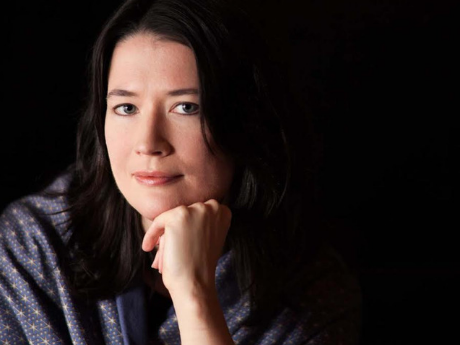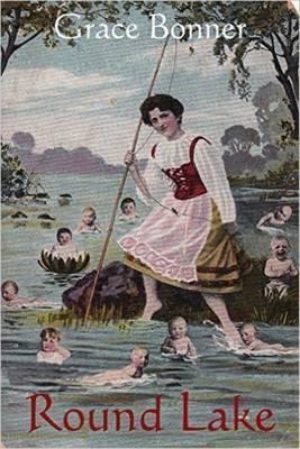In Their Own Words
Grace Bonner on “Stopping on Delos”

Stopping on Delos
I climb a hill
to the temple
of Isis.
Her missing face
looks out
to sea.
All her dreams
are nautical.
Poppies enfold
her granite
pedestal.
A bump, a burr,
a barnacle
flecked with red
paint, clings to
her waist.
Stub-thumb
of an ancient
child. Pagan
mother, take
my hand—tiny,
unsculpted, living.
August 2013
From Round Lake (Four Way Books, 2016). All rights reserved. Reprinted with the permission of the author.
On "Stopping on Delos"
This poem's origins go back to April 2008, when I was living in Paros, Greece, and had the privilege of being an artist-in-residence with a travel stipend at the Aegean Center for Fine Arts. Books I carried with me at that time included H.D.'s The Walls Do Not Fall, Elizabeth Bishop's Questions of Travel and Louise Gluck's The Wild Iris. A few months after my return, I typed a first draft of a poem:
Anamnesis
Delos
Gulls swarm.
Fish at the top
of our wake.
I keep thinking of her hand.
Three fingers remain of her right,
wrapped around her splendid, white-robed waist.
Left breast, full pitcher.
Headless, alone
in a field of wildflowers run
rampant in what was her home.
We celebrate a seventy-fifth birthday
with a bountiful taverna meal.
In the evening, the ferry lurches sickeningly.
Marion says her niece is thirty-one
and dying of cancer, gone to her liver.
My sister is the same age, doesn't want life.
One side of the ferry cuts
sunset water, rippling like the folds
of her robe.
The other is midnight blue,
her dress at Dawn.
Granite, limestone.
Red poppies—in wind,
in mind.
Of course I was haunted by the beautiful statue I'd seen on Delos. I was also haunted by my sister, who'd attempted suicide the previous year. Merriam-Webster defines anamnesis as "a recalling to mind." Its opposite is amnesia. Interestingly, for the case of my sister, the second definition of anamnesis is "a preliminary case history of a medical or psychiatric patient." When I started writing "Anamnesis," I couldn't have known that my mother would die within a week. I hid the poem in a drawer.
Two years later, I was able to read some of my old writing without cringing. I found "Anamnesis" in a folder, and saw that my travels in Greece had triggered memories of poems I'd loved as a teenager. I recognized the statue's "Left breast, full pitcher" from one of my favorite poems that I'd read and memorized in high school—Sylvia Plath's "Edge":
Each dead child coiled, a white serpent,
One at each little
Pitcher of milk, now empty.
Other images in my poem—the "poppies," and maybe even the "folds"—were also rooted in Plath. Encouraged, I decided to rewrite it.
With the help of a photograph I'd taken on Delos, I saw again the primary image of the statue in the field, and realized that she was not alone, as I'd originally believed. This was a critical discovery. Unless the statue had been modeled on a Byzantine contortionist, the fingers at her waist couldn't possibly have been her own. The missing hand must have belonged to her absent child.
I rewrote a three-page version of "Anamnesis," bringing in new images, settings and voices, including those of my sister—for whom I was grieving—and Emily Dickinson and John Berryman, taking care to put the pilfered words in italics. This second draft is broken into five parts—like a mosaic, or a floral bouquet scattered on the floor of some palace. It alternates between my own perspective, and what I imagined might have been my mother's and sister's points of view at the moments of their deaths. But it was impossible to imagine such things, and unbearable to try. The heart of the poem can be seen in the following section from the second draft. I've highlighted words and phrases that made it into the published version:
Amanesis
Delos
Gulls swarm.
Fish at the top
of our wake.
A ferry to the sacred
island of statues
cuts sunlit water
like an expert dressmaker.
I find Isis, headless,
alone in a field
home to rampant
wildflowers.
Three small fingers
and flecks of red paint
cling to the goddess's robe
at her waist.
Shoulders and neck show
her face turned away.
Bad mother.
Dumb sister,
she can't see you.
[…]
red poppies tremble
in wind, in mind.
[…]
Two years later, I saw that my poem didn't need other people's voices. I got my chisel and hacked away at the ugliest lines ("Shoulders and neck show her face turned away"—so clinical!) until I saw my statue's face, and knew what she dreamed:
Her missing face looks out to sea.
All her dreams are nautical.
I wrote a better title, combining the island's name with the idea of a brief visit/visitation, as well as with the sense of completing something. I brought my speaker back at the poem's end, where she addresses the statue as her mother. I sent the poem to Henri Cole at The New Republic. He helped me to tinker with it some more—and to discover my "pagan" mother in Plath—and thrilled me by publishing it.
"Stopping on Delos" was inspired by something I saw and felt on a day-trip with a group of art students, but it took five years to write and edit it to completion. I don't think most poems need to take half a decade in the writing, but this one marks a years-long emotional transformation. Like the child's fingers in the statue, my mother's and sister's traces couldn't be eradicated from the poem; mother and child are ultimately inseparable.



